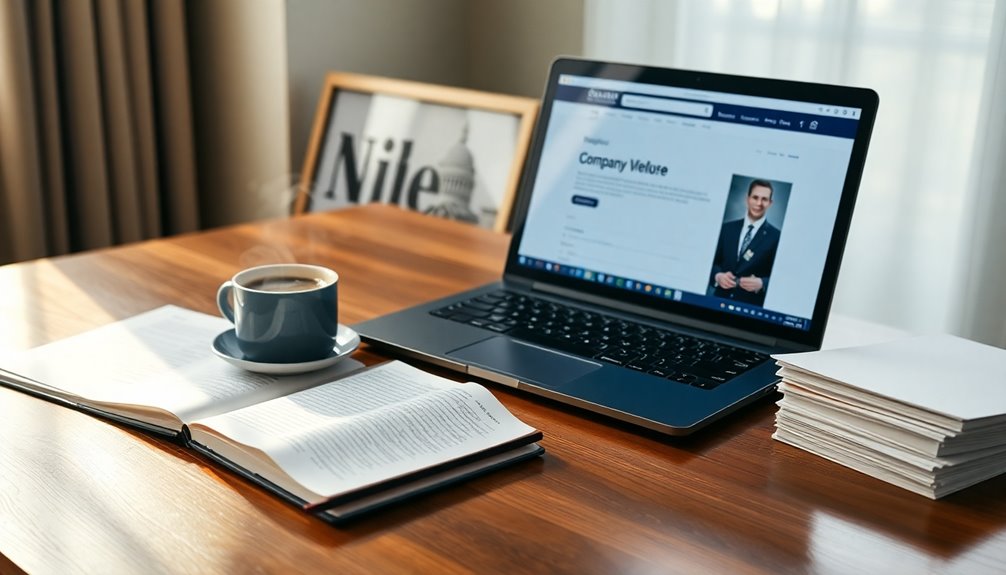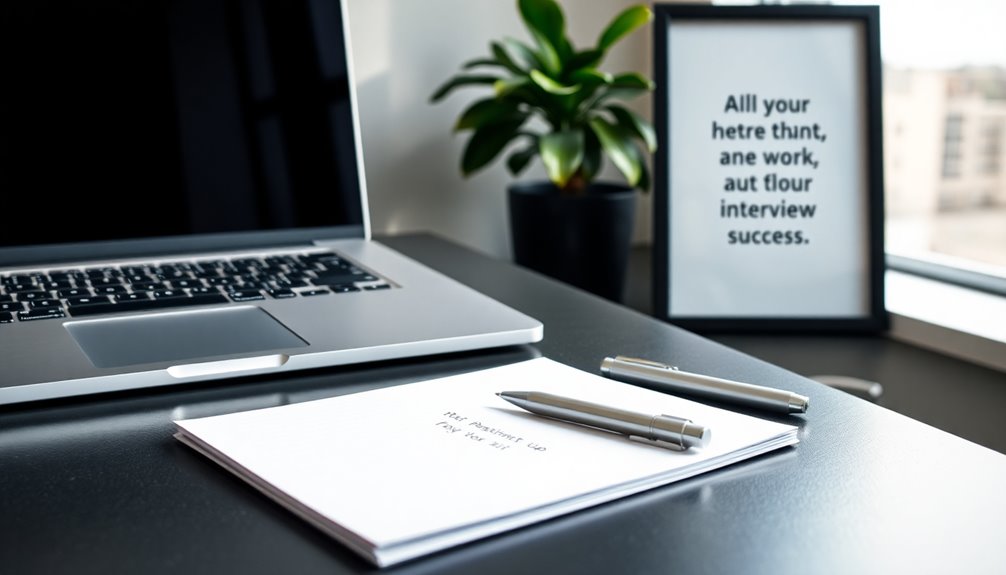To master interview answers for success, start with preparation. Familiarize yourself with common questions and the company's values. Practice using the STAR method for behavioral questions, focusing on your contributions and outcomes. Manage your nerves by using deep breathing techniques and maintaining confident body language. First impressions count—greet everyone warmly and dress professionally. Build rapport by engaging in light small talk and actively listening. Finally, always follow up after the interview to reinforce your interest. If you're keen to enhance your interview skills even more, there are plenty of strategies to explore further.
Key Takeaways
- Prepare by researching common interview questions and the company's values to tailor your responses effectively.
- Use the STAR method to structure answers for behavioral questions, ensuring clarity and relevance.
- Practice deep breathing and maintain confident body language to manage nerves and project assurance.
- Build rapport through small talk, personalizing interactions to create a relaxed atmosphere during the interview.
- Highlight your contributions and quantify results in your responses to demonstrate impact and personal growth.
Importance of Preparation

When it comes to nailing an interview, preparation goes a long way. You need to recognize that interviews are critical in your job search process. The more you prepare, the more confident you'll feel.
Start by understanding the dynamics of the interview, including common questions and the company's values. Pay attention to your body language and etiquette; they can greatly impact how you're perceived.
Research the company's products and culture to demonstrate your interest and initiative. By being well-prepared, you not only increase your chances of success but also create a positive impression.
Managing Nerves Effectively

Feeling nervous before an interview is completely normal, and knowing how to manage those nerves can make a significant difference in your performance.
Start by practicing deep breathing; inhaling deeply through your nose and exhaling slowly can calm your mind. Before speaking, count to three to gather your thoughts and reduce anxiety.
Maintain a confident posture—stand or sit tall, and keep your shoulders back. Make eye contact with the interviewer to show engagement and confidence. You can also subtly mirror their body language to build rapport.
Making Strong First Impressions

Making a strong first impression starts the moment you enter the building, setting the tone for the entire interview. Greet everyone you encounter with a smile and a confident, friendly demeanor.
Maintain eye contact to show engagement and sincerity. Your body language speaks volumes—stand tall, avoid crossing your arms, and use open gestures. Approach the receptionist or staff with respect; positive interactions can influence how others perceive you.
As you walk into the interview room, take a deep breath, and remind yourself to stay calm. A firm handshake can convey confidence, while your attire should reflect professionalism.
Building Rapport Through Small Talk

Small talk can be a powerful tool for building rapport during an interview. It helps create a relaxed atmosphere, easing both you and the interviewer into the conversation.
Start with friendly greetings and use the interviewer's name to personalize the interaction. Prepare a few light topics, such as current events or shared interests, to break the ice. This shows your engagement and makes you more relatable.
Approach small talk with a positive attitude, as it sets the tone for the rest of the interview. Remember, the goal is to establish a connection, so listen actively and respond genuinely.
Answering Behavioral Questions

When tackling behavioral questions in an interview, it's crucial to draw on your past experiences to showcase your skills and problem-solving abilities. Use the STAR method—Situation, Task, Action, Result—to structure your responses clearly and effectively.
Begin by briefly describing the situation and the task involved. Then, explain the actions you took, focusing on your specific contributions. Finally, highlight the results of your actions, quantifying them when possible to underscore your impact.
Avoid speaking negatively about past employers or colleagues; instead, emphasize what you learned from each experience. By presenting your experiences in this structured manner, you not only demonstrate your competencies but also show how you've grown as a professional.
This approach fosters a compelling narrative that interviewers appreciate.
Showcasing Authenticity and Personality

Presenting your authentic self during an interview can greatly enhance your connection with the interviewer. When you showcase your personality, it reveals who you truly are, making you more memorable. Share stories from your experiences that highlight your values and passions—this not only demonstrates your qualifications but also adds a personal touch. Don't shy away from discussing your interests outside work; it can help humanize you. Confidence in your responses is key; it shows you believe in yourself and your abilities. Balance professionalism with a bit of personal flair, as this fosters rapport. Additionally, maintaining a high vibrational energy during the interview can positively influence the overall atmosphere and your connection with the interviewer.
Researching the Company Thoroughly

Thoroughly researching the company before your interview is essential for making a strong impression. Familiarize yourself with its products and services, as well as any recent news or achievements. This knowledge not only demonstrates your initiative but also shows your genuine interest in the role.
Understand the company's culture and values to better align your responses during the interview. Additionally, knowing the industry landscape and competitors can help you speak intelligently about potential challenges and opportunities.
Prepare specific examples of how your skills align with the company's goals. By doing thorough research, you'll feel more confident and engaged, ultimately enhancing your chances of success in landing the job.
Following Up After Interviews

After you've put in the effort to research the company and make a strong impression during the interview, following up is your next important step. Sending a thank-you email within 24 hours shows your appreciation and enthusiasm for the position. In your message, express gratitude for the opportunity, reiterate your interest, and mention specific topics from the interview that resonated with you. This simple act can leave a lasting positive impression.
| Action | Timing | Purpose |
|---|---|---|
| Send Thank You Email | Within 24 hours | Show appreciation |
| Reiterate Interest | In the email | Reinforce your enthusiasm |
| Mention Interview Topics | In your message | Personalize your follow-up |
| Keep It Brief | One to two paragraphs | Respect the interviewer's time |
| Proofread | Before sending | Guarantee professionalism |
Frequently Asked Questions
What Should I Wear to an Interview?
When deciding what to wear to an interview, aim for professional attire that reflects the company culture.
A tailored suit or a smart dress will help you make a strong impression. Choose neutral colors, like navy or black, and avoid overly casual items. Confirm your clothes are clean and well-fitted.
Don't forget about grooming; neat hair and minimal accessories can elevate your look. Dressing appropriately shows respect and confidence in your abilities.
How Early Should I Arrive for an Interview?
You should aim to arrive about 10 to 15 minutes early for an interview.
This timeframe allows you to settle in and gather your thoughts without feeling rushed. Arriving too early can put pressure on the interviewer, while being late creates a bad first impression.
Use the extra time to review your notes or practice your responses. Remember, a calm demeanor sets a positive tone for the interview.
Can I Bring Someone With Me to the Interview?
Did you know that 70% of candidates who bring a support person feel more confident during interviews?
While it's generally acceptable to bring someone for moral support, you should check the company's policy beforehand. Some interviewers prefer a one-on-one setting to gauge your individual capabilities.
If you do bring someone, guarantee they remain quiet and supportive, allowing you to shine and engage fully with the interviewer.
Confidence is key!
What if I Don't Know the Answer to a Question?
If you don't know the answer to a question, don't panic. It's okay to admit it; just stay calm and composed.
You might say something like, "That's a great question, and I'd need to think it over." Then, offer to discuss your related experiences or knowledge. This shows your willingness to engage and learn.
How Do I Handle Salary Discussions During the Interview?
When salary discussions come up in an interview, it's important to be prepared.
Research market rates for the position beforehand. When asked, share a reasonable salary range based on your findings, showing you're open to negotiation.
Frame your expectations positively, emphasizing your willingness to discuss. This approach demonstrates that you value your skills while remaining flexible, which can leave a good impression on the interviewer.
Conclusion
In today's fast-paced job market, nailing your interview can feel like trying to catch lightning in a bottle. By preparing thoroughly, managing your nerves, and showcasing your authentic self, you set yourself up for success. Remember, it's not just about answering questions; it's about creating a connection. So, step into that interview room with confidence, armed with your well-researched insights, and leave a lasting impression. Your dream job is just around the corner!









